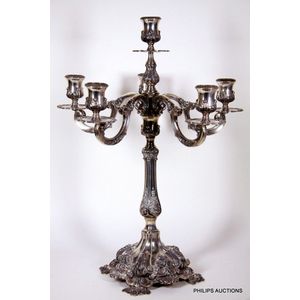Elaborate Topazio Silver Candelabrum, 20th Century
You must be a subscriber, and be logged in to view price and dealer details.
Subscribe Now to view actual auction price for this item
When you subscribe, you have the option of setting the currency in which to display prices to $Au, $US, $NZ or Stg.
- Acanthus - A stylized leaf motif, one of the primary decorative elements of classical Greek and Roman architecture, derived from the genus of flowering plants in the family Acanthaceae, native to tropical and subtropical regions of the Mediterranean area. It is a common element in classical Greek and Roman design, and is often seen in Corinthian and Composite order columns and used as a decorative element in English, European and Australian furniture, particularly on the curve of a leg, and as decoration for a corbel.
- Sterling Silver - Sterling silver is a mixture of 92.5% pure silver and 7.5% of another metal, usually copper. Fine silver is 99.9% pure silver, and is relatively soft and the addition of the very small amount of copper gives the metal enough strength and hardness to be worked into jewellery, decorative and household objects.
- Foliate - Decorated with leaves or leaf-like forms.
- Sconce - A light attached to a wall. Originally a candle holder that is attached to a wall with an ornamental bracket and sometimes with a reflective back plate, but now applied to an electric light that has been inspired by that design.
In recent times the word has also come into use to desribe the candle holders on a candelabra.
This item has been included into following indexes:
Visually similar items

Silver plated five branch ornate candelabrum with a pull out conversion for a single stem candlestick. Maker Dixon T. & Co height 74.5 cm

A George VI pair of sterling silver five light, four branch candelabra by Thomas Bradbury & Sons Ltd, Sheffield 1948 of typical Georgian design raised on stepped octagonal bases, 47 cm high

Elkington silver plated candelabra c1850 with four branches. Engraved with the Wyndham family crest of Wyndham Wines fame. 71 cm.

A fine pair of silver five branch candelabra by Carrington & Co, London 1906, finely chassed and embellished with repousse C scrolls feathers and garlands on baluster supports and shaped weighted bases, 5,140 grms (for the tops excluding the weighted bases
